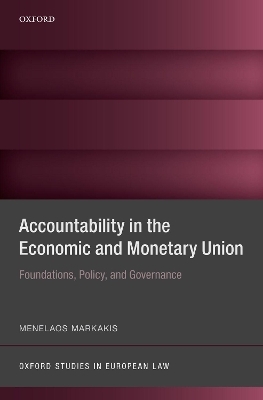
Accountability in the Economic and Monetary Union
Oxford University Press (Verlag)
978-0-19-884526-3 (ISBN)
Following the financial and public debt crisis, the EU's Economic and Monetary Union (EMU) has been under intense political scrutiny. The measures adopted in response to the crisis have granted additional powers to the EU (and national) authorities, the exercise of which can have massive implications for the economies of the Member States, financial institutions and, of course, citizens. The following questions arise: how can we hold accountable those institutions that are exercising power at the national and EU level? What is the appropriate level, type and degree of accountability and transparency that should be involved in the development of the EU's governance structures in the areas of fiscal and economic governance and the Banking Union? What is the role of parliaments and courts in holding those institutions accountable for the exercise of their duties? Is the revised EMU framework democratically legitimate? How can we bridge the gap between the citizens - and the institutions that represent them - and those institutions that are making these important decisions in the field of economic and monetary policy?
This book principally examines the mechanisms for political and legal accountability in the EMU and the Banking Union. It examines the implications that the reforms of EU economic governance have had for the locus and strength of executive power in the Union, as well as the role of parliaments (and other political fora) and courts in holding the institutions acting in this area accountable for the exercise of their tasks. It further sets out several proposals regarding transparency, accountability, and legitimacy in the EMU.
Dr Menelaos Markakis is an Assistant Professor at University Rotterdam and Stipendiary Lecturer in EU Law at Worcester College, Oxford. He holds degrees from the Universities of Athens (where he graduated 1st in his class) and Oxford (MJur and DPhil). His research and teaching primarily focus on EU constitutional law, internal market law, Economic and Monetary Union, and EU financial law more broadly. He has published his research in prestigious peer-reviewed journals and edited volumes. His research that led to this book was funded from the Academy of Athens, the Oxford Law Faculty, the Modern Law Review award, and the European Research Centre for Economic and Financial Governance (Leiden, Delft and Erasmus Universities).
1: Introduction
2: The Crisis-Induced Developments in the Economic and Monetary Union
3: The Implications of the Revised EU Economic Governance Framework for National Economic Policy
4: Democracy, Legitimacy and Accountability in Euro Crisis Management
5: Division of Power, Democratic Input, and Accountability Structures in the EU's Banking Union
6: Judicial Review of Economic Policy: The EU Courts
7: Judicial Review of Economic (and Monetary) Policy: The National Courts
8: Judicial Review of the European Central Bank's Actions
9: Recommendations
| Erscheinungsdatum | 03.01.2020 |
|---|---|
| Reihe/Serie | Oxford Studies in European Law |
| Verlagsort | Oxford |
| Sprache | englisch |
| Maße | 162 x 230 mm |
| Gewicht | 832 g |
| Themenwelt | Recht / Steuern ► EU / Internationales Recht |
| Recht / Steuern ► Öffentliches Recht | |
| Recht / Steuern ► Wirtschaftsrecht ► Bank- und Kapitalmarktrecht | |
| Wirtschaft ► Volkswirtschaftslehre ► Makroökonomie | |
| ISBN-10 | 0-19-884526-X / 019884526X |
| ISBN-13 | 978-0-19-884526-3 / 9780198845263 |
| Zustand | Neuware |
| Informationen gemäß Produktsicherheitsverordnung (GPSR) | |
| Haben Sie eine Frage zum Produkt? |
aus dem Bereich


